MTRON SSD 32GB: Wile E. Coyote or Road Runner?
by Gary Key on August 15, 2007 3:00 AM EST- Posted in
- Storage
PCMark05 Performance
We are utilizing the HDD test suite within PCMark05 for further comparative hard disk scores as it provides a mixture of actual application results and specific read/write percentages utilized within these programs. The program utilizes the RankDisk application within the Intel iPEAK SPT suite of tools to record a trace of disk activity during usage of real world applications. These traces are then replayed to generate performance measurements based upon the actual disk operations within each application. The HDD test suite contains 53% read and 47% write operations with each trace section utilizing varied amounts of read or write operations. Additional information about the test suite can be found in PDF format here PCMark05 whitepaper.
Our test results are based upon the following trace runs:
Windows XP Startup: This test consists of 90% reading and 10% writes that tracks XP activities at start-up.
Application Loading: This test consists of 83% reading and 17% writes that tracks the opening and closing of the following programs.
File Write: This test consists of 100% write activities by writing 680MB of files onto the hard disk.
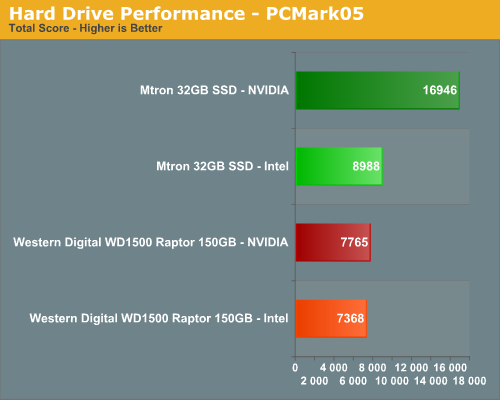
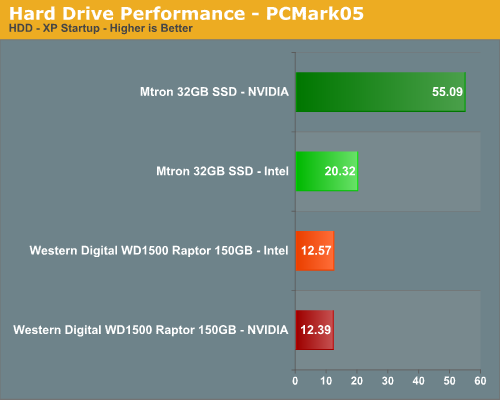
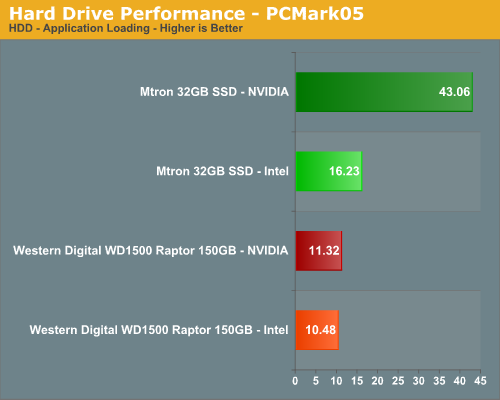
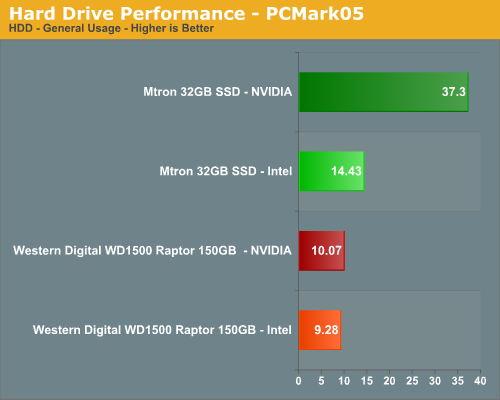
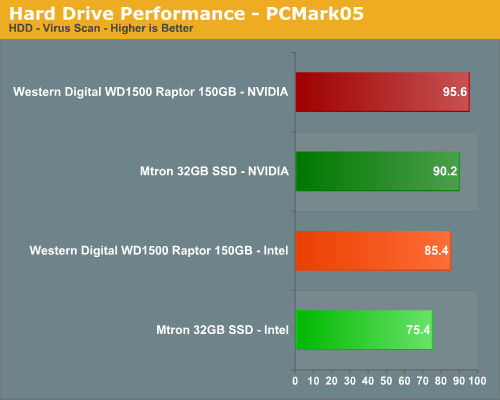
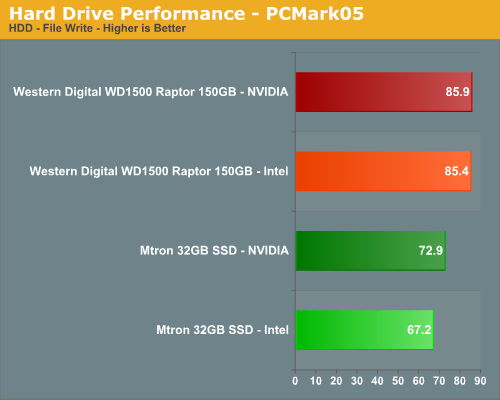
Our PCMark05 results show a new benchmark champion, and of course if you are using an NVIDIA based chipset then the resulting numbers are just that much better. Solid State Drives feature extremely low access times that are usually in the <1ms range and the first three PCMark05 test that emphasize read speeds over write speeds show the MTRON drive just walking all over the Raptor, especially with the NVIDIA chipset. While the numbers are impressive with the NVIDIA chipset, we tend to believe the Intel generated numbers are closer to actual application performance while the NVIDIA numbers are more representative of the hard drive's pure performance capability.
We fully expected the MTRON drive to score higher in the almost read only Virus scan test but it surprised us with a score slightly less than the Raptor, indicating that small block sequential file reads are not optimized on the drive at this time. We noticed the same pattern in our internal iPEAK tests where the drive scored about the same as the Raptor in the AVG virus scan and Winstone video creation tests. There is a 19% difference between the NVIDIA and Intel chipsets with the MTRON drive.
File Write tests tend to show major differences between the SSD and mechanical disks in our tests to date. The lower write speeds of the MTRON disk are in alignment with our expectations based on the drive's 80 MB/sec write speed specification. The results in PCMark05 were reproducible in our revised iPEAK test suite although we are still investigating the wide disparity between the NVIDIA and Intel controllers. However, pure hard drive performance is just one aspect of testing so let's see how the drive fares in a few application test results with both controller chipsets.
We are utilizing the HDD test suite within PCMark05 for further comparative hard disk scores as it provides a mixture of actual application results and specific read/write percentages utilized within these programs. The program utilizes the RankDisk application within the Intel iPEAK SPT suite of tools to record a trace of disk activity during usage of real world applications. These traces are then replayed to generate performance measurements based upon the actual disk operations within each application. The HDD test suite contains 53% read and 47% write operations with each trace section utilizing varied amounts of read or write operations. Additional information about the test suite can be found in PDF format here PCMark05 whitepaper.
Our test results are based upon the following trace runs:
Windows XP Startup: This test consists of 90% reading and 10% writes that tracks XP activities at start-up.
Application Loading: This test consists of 83% reading and 17% writes that tracks the opening and closing of the following programs.
- Microsoft Word
- Adobe Acrobat Reader
- Windows Media Player
- 3Dmark 2001SE
- Leadtek WinFast DVD
- Mozilla Internet Browser
- Opening a Microsoft Word document, performing grammar check, saving and closing.
- Compression and decompression using WinZip
- Encrypting and decrypting a file using PowerCrypt
- Scanning files for viruses using F-Secure Antivirus
- Playing an MP3 file with Winamp
- Playing a WAV file with Winamp
- Playing a DivX video using DivX codec and Windows Media Player
- Playing a WMV video file using Windows Media Player
- Viewing pictures using Windows Picture Viewer
- Browsing the Internet using Microsoft Internet Explorer
- Loading, playing and exiting a game with Tom Clancy's Ghost Recon
File Write: This test consists of 100% write activities by writing 680MB of files onto the hard disk.






Our PCMark05 results show a new benchmark champion, and of course if you are using an NVIDIA based chipset then the resulting numbers are just that much better. Solid State Drives feature extremely low access times that are usually in the <1ms range and the first three PCMark05 test that emphasize read speeds over write speeds show the MTRON drive just walking all over the Raptor, especially with the NVIDIA chipset. While the numbers are impressive with the NVIDIA chipset, we tend to believe the Intel generated numbers are closer to actual application performance while the NVIDIA numbers are more representative of the hard drive's pure performance capability.
We fully expected the MTRON drive to score higher in the almost read only Virus scan test but it surprised us with a score slightly less than the Raptor, indicating that small block sequential file reads are not optimized on the drive at this time. We noticed the same pattern in our internal iPEAK tests where the drive scored about the same as the Raptor in the AVG virus scan and Winstone video creation tests. There is a 19% difference between the NVIDIA and Intel chipsets with the MTRON drive.
File Write tests tend to show major differences between the SSD and mechanical disks in our tests to date. The lower write speeds of the MTRON disk are in alignment with our expectations based on the drive's 80 MB/sec write speed specification. The results in PCMark05 were reproducible in our revised iPEAK test suite although we are still investigating the wide disparity between the NVIDIA and Intel controllers. However, pure hard drive performance is just one aspect of testing so let's see how the drive fares in a few application test results with both controller chipsets.










37 Comments
View All Comments
mostlyprudent - Wednesday, August 15, 2007 - link
I hope Gary's 3 year prediction is as wrong as AT's (and just about everyone else's) prediction about DDR3 speeds and latencies! I am quite impressed by what has happened in SSD technology over the last year or so.AnnihilatorX - Wednesday, August 15, 2007 - link
Well I do rip loseless audio from CDs. On some types of music I can hear differences betwween mp3 and ape32GB is just enough for a Windows installation plus few applications
It's best to store multimedia files to a HDD
yyrkoon - Thursday, August 16, 2007 - link
80MB/s sustained is more than enough for video editing, and I am not sure you guys understand this or not, but until now, this is the first test I have personally seen that the SSD comes this close to overall standard HDD in performance. The Raptor may peak higher, but if I am reading these benchmarks correctly, this drive is FAST. Take the sub milisecond access times, and you have something worth talking about.As for Windows boot times, I think if you compared this even to a Raptor, you would notice a diference in bootup times. Windows may not need much more than ~12MB/s transfers, but the very low access times will show a noticable difference. Maybe only a second or two, but in Windows boot times, this is outstanding given the current performance of all current HDDs.
Uh, WinXP only needs ~1.5GB-4GB for a base install, this gives plenty of room for other applications. I do not know how other people install their OSes, but this is perfect for me, since I keep all my data(important or not) on a different drive from the OS anyhow. This SSD would probably serve great as a Photoshop scratch disk as well . . .
GlassHouse69 - Wednesday, August 15, 2007 - link
Windows itself doesnt need a fast drive. I load up windows 1x every 2-3 weeks. It is on 24/7. The swap file is affected, but with 2 gb of ram, dual core, xp pro, O&O defrag and no random crap programs loaded into memory unnecessarily, I never see my hd tic when I am using windows.Now, network transfers it can show, but that is for 1 hour here and there, maybe 3-4x a month. Really, what the fast hd is used for is encoding or decoding, compressing and uncompressing, and, most importantly, games. There you would never dream of using anything less than 100 gigs of space. So, this thing is completely useless. yay! I mean, unless you make a partition for your favorite games and another for some ripping usage, 32 gb is next to useless.
it is a great write up though. nicely done
AnnihilatorX - Friday, August 17, 2007 - link
Not entirely trueAlthough Windows at run-time does not need a fast drive,
Windows at boot-time and applications at load-time do improve a lot
Windows startup is 2x faster on SSD
That alone is the biggest selling point of SSD
Calin - Wednesday, August 15, 2007 - link
You might want to try a quick and dirty benchmark in Linux, maybe the situation is simply related to drivers. And maybe some quick and dirty benchmarks in XP versus Vista, just to see if the Intel chipset is slower in all configurationsEpyon - Wednesday, August 15, 2007 - link
Thanks for the review. Its great to have some concrete numbers to base opinions on SSDs.